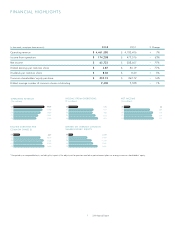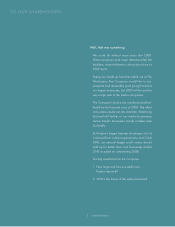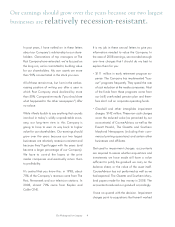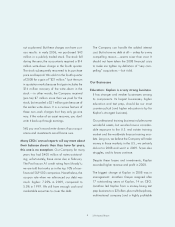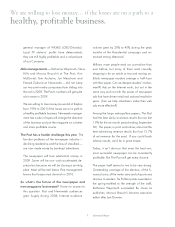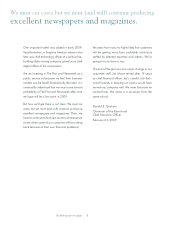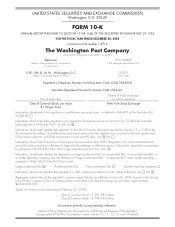Washington Post 2008 Annual Report Download - page 9
Download and view the complete annual report
Please find page 9 of the 2008 Washington Post annual report below. You can navigate through the pages in the report by either clicking on the pages listed below, or by using the keyword search tool below to find specific information within the annual report.general manager of WKMG (CBS/Orlando).
Local TV stations’ profits have deteriorated;
they are still highly profitable and a valued part
of our Company.
Able managements — Katharine Weymouth, Steve
Hills and Marcus Brauchli at The Post; Ann
McDaniel, Tom Ascheim, Jon Meacham and
Fareed Zakaria at Newsweek — did not keep
our two print media companies from sliding into
the red in 2008. The Post’s numbers will get quite
a bit worse in 2009.
We are willing to lose money (as we did at Kaplan
from 1994 to 2001) if the losses are on a path to
a healthy, profitable business. Newsweek manage-
ment has a plan it hopes will change the direction
of the business and put the magazine on a better
and more profitable course.
The Post has a harder challenge this year. The
familiar problems of the newspaper industry —
declining readership and the loss of classified —
are now made worse by bankrupt advertisers.
The newspaper will lose substantial money in
2009. Some will be non-cash accelerated de-
preciation because we will be closing a printing
plant. Most will be real losses. Post management
knows that losses must diminish in 2010.
So what’s the future of the newspaper and
newsmagazine businesses? I have no answer to
this question. Post and Newsweek audiences
grew hugely during 2008; Internet audience
volume grew by 30% to 40% during the peak
months of the Presidential campaign and re-
mained strong afterward.
Millions more people read our journalism than
ever before, but many of them read casually,
dropping in for an article or two and moving on.
(Daily newspaper readers average a half-hour
with their paper. Can we deepen readers’ involve-
ment?) Ads on the Internet work, but not in the
same way and not with the power of newspaper
ads that have driven retail and national results for
years. (Can we help advertisers make their web
ads more effective?)
Among the large metropolitan papers, The Post
had the best daily circulation results (but we lost
1.9% for the six-month period ending September
30). The paper, in print and online, also had the
best advertising revenue results (but lost 13.7%
of ad revenue for the year). If you could bank
relative results, we’d be in great shape.
Today, it isn’t obvious that even the best-run,
most successful newspaper can be consistently
profitable. But The Post will get every chance.
The paper itself seems to me to be very strong.
Outstanding coverage of the election, of the fi-
nancial crisis, of the metro area and of sports was
obvious to readers. Six Pulitzer prizes awarded in
the spring testified to the strength of the staff;
Katharine Weymouth succeeded Bo Jones as
publisher; Marcus Brauchli became executive
editor after Len Downie.
72008 Annual Report
We are willing to lose money… if the losses are on a path to a
healthy, profitable business.



